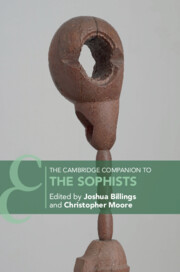Book contents
- The Cambridge Companion to the Sophists
- Other Volumes in the Series of Cambridge Companions
- The Cambridge Companion to the Sophists
- Copyright page
- Contents
- Contributors
- Note on the Text
- Introduction
- Part I Contexts
- Part II Thought
- Part III Receptions
- 12 The Fourth-Century Creative Reception of the Sophists
- 13 Writing the First Sophistic
- 14 The Sophists in the History of Philosophy
- Appendix: The People of the Sophistic Period
- Select Bibliography
- Index
- OTHER VOLUMES IN THE SERIES OF CAMBRIDGE COMPANIONS (continued from page ii)
13 - Writing the First Sophistic
from Part III - Receptions
Published online by Cambridge University Press: 23 December 2023
- The Cambridge Companion to the Sophists
- Other Volumes in the Series of Cambridge Companions
- The Cambridge Companion to the Sophists
- Copyright page
- Contents
- Contributors
- Note on the Text
- Introduction
- Part I Contexts
- Part II Thought
- Part III Receptions
- 12 The Fourth-Century Creative Reception of the Sophists
- 13 Writing the First Sophistic
- 14 The Sophists in the History of Philosophy
- Appendix: The People of the Sophistic Period
- Select Bibliography
- Index
- OTHER VOLUMES IN THE SERIES OF CAMBRIDGE COMPANIONS (continued from page ii)
Summary
The Lives of the Sophists, written by the third-century-CE author Philostratus, contains the most detailed and thorough image of a Classical-period sophistic age surviving from antiquity. Previous ancient accounts of the period are comparable with that of Philostratus in various respects but never emphasize a discrete sophistic age. Philostratus’ text has been known continuously since its production, and the individual members of Philostratus’ First Sophistic were arguably the core for modern lists of the individual Sophists. Yet Philostratus’ image of the First Sophistic is colored by oratorical practices of his own day, privileging the craft of speaking performance, networks of influence and rivalry, and leadership of the city over the kind of intellectual performances that interested philosophers such as Plato. Despite his obvious departures from Plato, Philostratus also depends on Plato for qualities that establish a “Sophist” under his concept, both in the Classical period and in his own.
- Type
- Chapter
- Information
- The Cambridge Companion to the Sophists , pp. 370 - 402Publisher: Cambridge University PressPrint publication year: 2023

